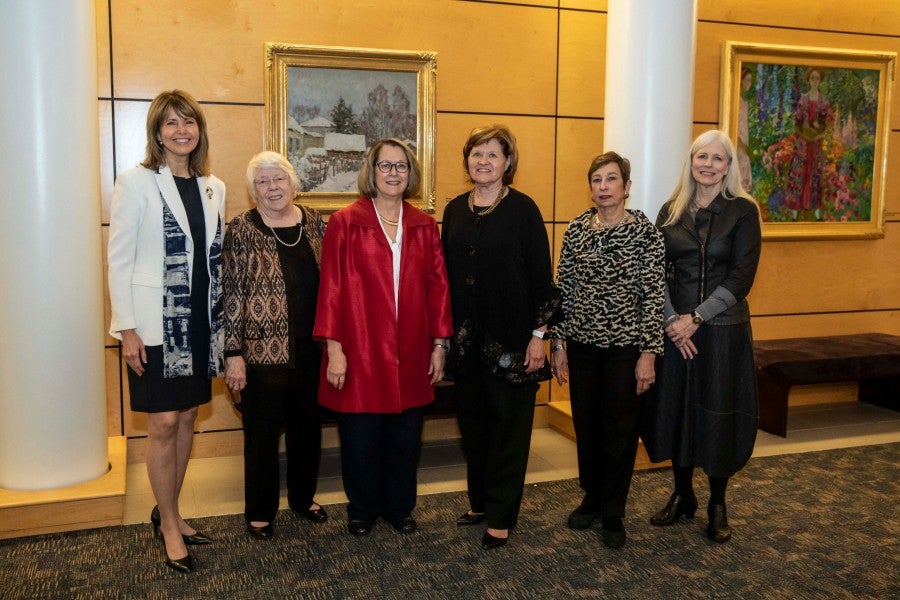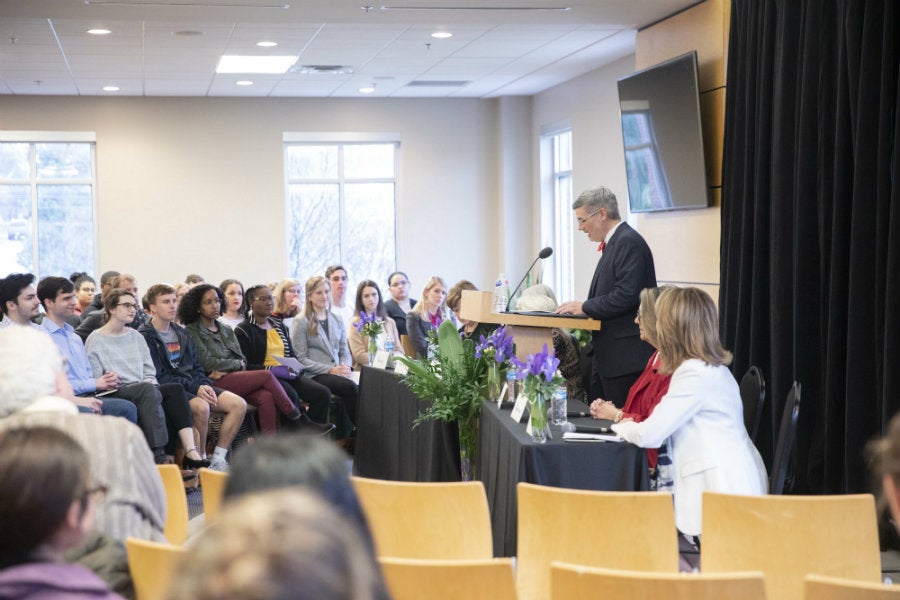Students hear from the Women of the Tennessee Supreme Court
Student-hosted forum featured women who have served on Tennessee’s Supreme Court before the 2020 Fred Gray dinner.
Cate Zenzen |

The Fred D. Gray Institute for Law, Justice and Society, housed in the College of Leadership & Public Service hosted a dinner and conversation with the Women of the Tennessee Supreme Court on February 10. The event featured a discussion on law, the court and the lives of these women as they navigated both. Earlier that day, the department hosted a student forum to begin the conversation.
In honor of 100 years of women’s suffrage in Tennessee, event and forum speakers were all women who have made significant contributions to their community and to the field of law. Speakers included Justice Cornelia A. Clark, Justice Sharon Lee, Justice Holly Kirby, Former Justice Janice Holder, Former Justice Penny White, and Justice Martha Craig Daughtrey. The student forum was moderated by Kimberly McCall, adjunct faculty in the Fred D. Gray Institute for Law, Justice and Society, and students Jayla Williams, Mimi Vance and May Hartness.
To begin the discussion, each woman shared her path to the court system. Almost all noted that they pursued other fields after their college years, and many thought they would become teachers or nurses. A career in law did not seem accessible because of how rare women lawyers and judges were at the time.
“As much as that has changed, still things have remained the same,” said Holder, who acknowledged there are more women in the court, but many people still do not associate the role of judge with a female.
For some, the bias against women was exactly why they chose to work in law. Daughtrey’s journey to the profession began when she was challenged by the concept “separate but equal,” a reality she faced as one of three women in her law school class. Clark first considered law at the beginning of her career as a teacher of American History and Political Science. At the time, she also volunteered with a congressional race. With a curriculum centered around the actions of influential people and her work alongside passionate advocates in the campaign program, Clark was inspired by the idea of changing the world.

Students gathered in Swang Chapel to hear a history-making discussion including all six women who have been appointed to Tennessee's Supreme Court.
Certainly each woman’s journey to the judge seat was not easy. Justice Holder, from West Tennessee, began her application for the Tennessee Supreme Court with a lawsuit. At the time, the seat was open only to applicants from the eastern part of the state, and therefore had to be challenged.
Lee recollected several instances in her career where her male counterparts did not treat her as an equal. As a young lawyer, she ignored the comments, but she is now proud of the women who stand up for themselves.
White noted that she was the first justice not reelected in a Tennessee Supreme Court retention election, a hard loss for her. She found a new path as a professor and director of the Center for Advocacy and Dispute Resolution at the University of Tennessee College of Law.
“Let’s hope that the legal profession continues to mount challenges,” said White, who has seen prejudice take many forms as a professor.
The justices also shared what helped them overcome these barriers. Kirby acknowledged the importance of mentorship and urged students to search for mentors in many different forms.
“Remember, there are good men out there, and they will support you,” she said.
Other points of discussion included work-life balance, the difference in the suffrage movements for white and black women, and the changes they hope to see in the future.
“It’s not perfect and more needs to be done, but I look around here and see that progress has been made,” said Daughtrey.
About the Fred D. Gray Institute for Law, Justice & Society
Housed in Lipscomb University’s College of Leadership & Public Service, the Fred D. Gray Institute for Law, Justice & Society is based on the idea that legal change is one of the surest means to effect social change. Here, students consider America’s legal system from a multidisciplinary perspective to get a fuller understanding of its mechanisms, practice and consequences.
The institute is home to an undergraduate major that focuses on socio-legal issues in order to encourage critical thinking, good writing and a passion for justice. The program prepares students for law school, public policy or governmental work, and work with nonprofits. Students, faculty and mentors examine how law and society work together and how justice is built in the midst of that.
In addition to the academic work of LJS, the institute has hosted conversations involving immigration, human trafficking, Christian/Muslim/Jewish relations and health care for low-income families. As part of the institute’s involvement in the legal community, LJS partners with the Tennessee Bar Association to host a summer Law Camp for high school students interested in a career in the legal field.